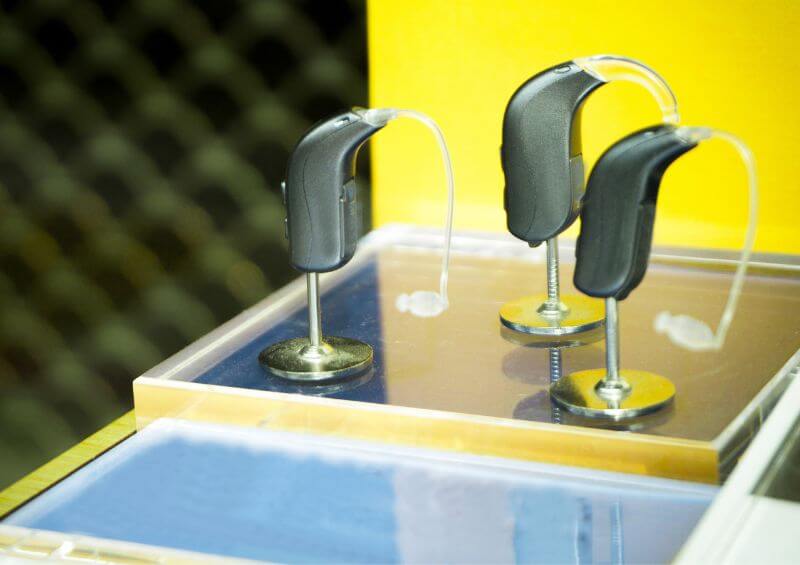OTC (Over the Counter) Hearing Aids vs. Prescription Hearing Aids: Which Are Right for Me?
In August, the FDA finalized a ruling allowing a new category of hearing aids to be sold in pharmacies and online. These over-the-counter hearing aids (OTCs) were approved for use because of the increasing number of individuals with untreated hearing loss. In fact, almost 30 million people in the U.S. today could benefit from hearing aids. Despite this, only 1 in 3 people over 70 with significant hearing loss have ever used hearing aids. With hearing loss linked to dementia, depression, social isolation, and a general decline in quality of life, there’s no doubt that treatment for hearing loss should be more widely available.
While the new law aims to increase access to affordable options for those with mild to moderate hearing loss, OTCs are not suited for all types of patients or hearing loss. Before OTCs, hearing aids could only be prescribed and fit by a licensed hearing care professional. Though they look the same on the outside, these two categories of hearing technology are very different. To find which type of hearing aid is best for you, take careful consideration and consult with an experienced professional.
What’s the Difference Between OTC and Prescription Hearing Aids?
Hearing aids set up by a hearing care professional like an audiologist are widely considered “prescription” hearing aids. An audiologist will perform unbiased diagnostic testing and physical evaluations to determine whether you have hearing loss that requires hearing aids. Audiologists undergo years of specialized training to diagnose and treat hearing loss, among other ear disorders.
In an appointment for traditional hearing aids, a hearing professional will conduct more measurements to customize your hearing instrument to your ear size, shape, and hearing loss you experience at specific frequencies.
An OTC hearing aid is a new category of hearing device that allows an individual to purchase it online or at a pharmacy without the consultation of a hearing care professional. This means that the individual must decide for themselves if they have hearing loss. They are also self-fit and offer no professional hands-on support and fitting. You may not experience the most comfortable or secure fit.
Intended for those with mild hearing losses, most OTCs offer a general amplification of all sounds, including noises you may not want to be louder—not all situations need the same bump in volume. Modern hearing aids fit by an audiologist offer incredible features such as automatic background noise reduction, volume controls, Bluetooth connection to a phone, and even different sound settings for your most common surroundings. Unlike OTCs, they also offer custom fitting options for your ear shape and stylistic preferences.
Should I Use OTC Hearing Aids?
Only those with mild to moderate hearing loss should consider OTC hearing aids, but it is still recommended that you are clinically diagnosed before making a purchase. The new devices also cannot be used by anyone under 18.
“Prescriptive” hearing aids purchased through an audiologist can be custom fit for all levels of hearing loss from mild to profound at any age. They also offer a wide variety of hearing aid models, including behind the ear (BTE), receiver in the canal (RIC), and completely in-the-canal options. People have different lifestyles, which means there is no true “one-size fits all” hearing aid. Talking to an audiologist about your lifestyle and habits is the best way to choose the right option and ensure you enjoy your hearing aids for years to come.
Which Hearing Aid Is Best For Me?
The new rule goes into effect on October 17th, 2022, which means you may come across them on shelves in the coming weeks. Dr. Amanda Kluzynski, AuD of the MedRx Hearing Center in Largo, Florida, recommends before purchasing an OTC hearing aid, you receive a hearing test to determine if your hearing loss requires a hearing aid. MedRx Hearing Center offers free hearing screenings and consults to help you make the most informed choice.
With proper guidance and care, hearing aids can open you up to countless new social and interactive opportunities you may have missed before regaining your sense of hearing. While OTC’s may seem easier at first glance, they are not the best option for many people and can cause trouble down the road. An established audiologist can help you make the best choice for your hearing loss.
Dr. Amanda Kluzynski is a Fellow of the American Academy of Audiology, a member of the American Speech Language Hearing Association, holds a Certificate of Clinical Competency in Audiology, and is certified by the American Board of Audiology. If you’re interested in scheduling a free hearing evaluation and consultation, contact the MedRx Hearing Center at (727) 584-9696.

